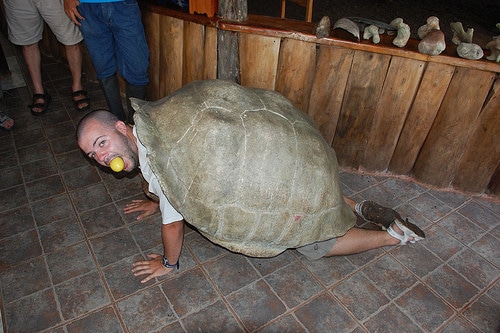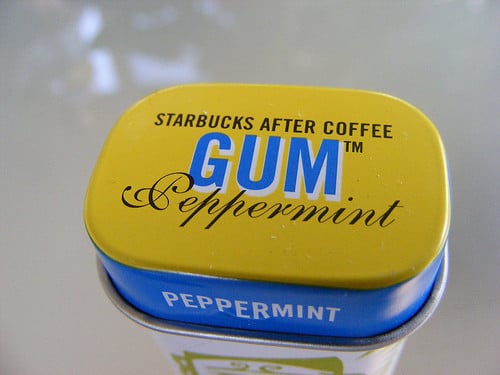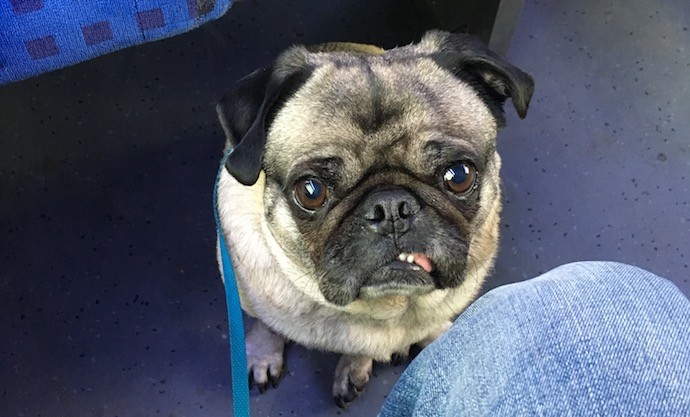We often associate traveling with high calorie airplane food, but when it comes down to it, traveling makes it harder to come by a meal. Instead of stuffing yourself after starving yourself for hours while touring around a city, make your meals last longer by adding a few small ingredients to them.
Peanut Butter
 Include a teaspoon of peanut butter with your breakfast to slow down the digestion of carbohydrates by an average of two hours. Most sugars, like bread and orange juice, break down in around 20 minutes and give you a short energy boost. The oils in peanut butter slow down this process so these foods will slowly power you until your next meal.
Include a teaspoon of peanut butter with your breakfast to slow down the digestion of carbohydrates by an average of two hours. Most sugars, like bread and orange juice, break down in around 20 minutes and give you a short energy boost. The oils in peanut butter slow down this process so these foods will slowly power you until your next meal.
Additional Tips:
- Select commercial, non-organic brands of peanut butter to carry with you, since they don’t require refrigeration and will last up to 6 months.
- Peanut butter can be used to shift your body clock to avoid jet lag.
- Almond, cashew, and hazelnut butter also have a similar effect but are runnier and generally require refrigeration after opening.
Water
 Dieters know the benefits (outside of hydration) that come with drinking lots of water. When you find a source of clean water (in many countries bottled is the only way) drink twice as much as you think you’ll need to quench your thirst. Water not only acts as a digestion buffer, causing other foods in your stomach to break down slower and last longer, but staying hydrated dilutes your blood sending less signals to the region of your brain (hypothalamus) that controls hunger.
Dieters know the benefits (outside of hydration) that come with drinking lots of water. When you find a source of clean water (in many countries bottled is the only way) drink twice as much as you think you’ll need to quench your thirst. Water not only acts as a digestion buffer, causing other foods in your stomach to break down slower and last longer, but staying hydrated dilutes your blood sending less signals to the region of your brain (hypothalamus) that controls hunger.
Additional Tips:
- Drinking plenty of water can also help you avoid travelers’ constipation.
- Be careful not to drink ‘extreme’ amounts of water, which vary based on your body, overall health, and outside temperature. Too much water can actually flush important vitamins and minerals out of your system.
- Add Some Salt: A little bit of salt can actually help you retain water.
Eat Slower
 It takes your intestines about 20 minutes to send the right signals to your brain to tell you “you’re full”. Let your body work for you by eating slow enough to allow these signals to satisfy your hunger so you don’t overeat and end up hunger (or sick) hours later. Don’t rush your meal and instead integrate them into your travels. (Don’t forget to take pictures!)
It takes your intestines about 20 minutes to send the right signals to your brain to tell you “you’re full”. Let your body work for you by eating slow enough to allow these signals to satisfy your hunger so you don’t overeat and end up hunger (or sick) hours later. Don’t rush your meal and instead integrate them into your travels. (Don’t forget to take pictures!)
Additional Tips:
How Stuff Works has an excellent set of tips on how to keep your eating speed limit.
- Swallow what is in your mouth before preparing the next bite.
- Put your fork or spoon down after every bite.
- Relax before you start eating.
Peppermint Gum
 Research conducted at Glasgow Caledonia University in Scotland [pdf] suggest that chewing peppermint gum may help suppress appetite after a meal. The study showed that all gum had a moderate effect on appetite, so if peppermint isn’t your favorite you might still be able to extend your time between meals by having a piece.
Research conducted at Glasgow Caledonia University in Scotland [pdf] suggest that chewing peppermint gum may help suppress appetite after a meal. The study showed that all gum had a moderate effect on appetite, so if peppermint isn’t your favorite you might still be able to extend your time between meals by having a piece.
- Chewing gum is one of my small travel essentials and great for your breath when you can’t find a place to brush.
Other Ways To Make Your Food Last Longer
Not all travelers are young and single as Soultravelers3 points out which is why your should pick up the tricks in the video below on storing your food so it lasts longer.
Adding a small amount of omega-3 and omega-6 oils from sources like olive oil, nuts, and fish alongside any food will increase the efficiency of each calorie. You don’t have to eat more or less when you travel but you should appreciate each meal and have it work for you, not the other way around. If you can’t find anything but junk food in a certain area, eat as little as you need to get going until you think you can find a proper meal to enjoy – and that will last!
[photos by: sparktography, Fatty Tuna, olliethebastard, JimmyMac210]












Very practical tips! Things that we all probably know, but have yet to put it together in our heads that this is how we make meals last!
@ jen:
Pretty straightforward, but many people forget the peanut butter! Works wonders on making a meal last just that little bit longer.
Valuable tips. Some of them I knew already like drinking water and eating slowly.
Yes, you are right. People forget about peanut butter.
Very nice post! You should learn from your own advice to eat SLOWER!!!!
@ Cuckoo:
I’ve got the water down, but eating slowly…
@ Stina:
That’s one lesson I’ve been working on, but not much progress 😛
I try to get a room with at least a fridge, or a kitchen for longer stays. The money you save by eating some meals in and being able to snack on your own time is substantion.
I save my money for good meals at nicer restaurants, or nice wine or drinks at night. And if you have a busy day you aren’t obligated to plunk yourself down at a cafe for an hour when hungry getting served and tipping when you really want to be doing other stuff.
I just spent a few days in Mexico, and the first stop was the local grocery store. Here’s a photo of my fridge:
http://futuregringo.com/puertovallarta/fridge.jpg
I probably went through about seven of those huge water bottles over four days. And on another budget note – if you find a real grocery store you pay less for all this food. Plus the chorizo and fresh tomatoes I bought were wonderful to cook up.
I just remembered something. I was at a cafe in Europe by myself, and set up my camera on the table to take a video of my enjoying the breakfast.
I was in no hurry, but after watching it I saw I was eating like a horse practicing shoveling in my food. It made me slow down a lot. At least I think I do.
I’ll put it on YouTube if I get brave enough sometime.
@ james:
The fridge is crucial – nice fridge btw, pretty healthy.
You should post that video, it can’t be as half bad as I am. I probably chew 2-4 times max. on each bite. It’s a nasty habit – but I haven’t heard any conclusive reasons as to why…except that the faster you eat the faster you tend to get hungry.